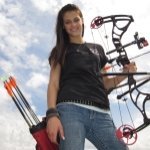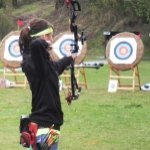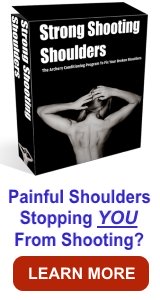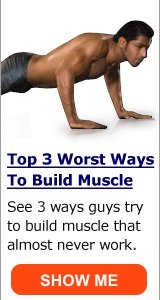Selecting Proper Draw Weight
For Beginner And Recreational Archers
Selecting the proper draw weight for recurve and compound archers is a topic that is thorny at the very least.
Determining what is right for the individual greatly depends on your skill level and what you hope to achieve as an archer.
Perhaps you are inquiring because you have never shot a bow before.
My Proper Archery
Equipment Checklist
- Eye Dominance
- Left or Right Hand
- Proper Bow Size
- Proper Draw Length
- Proper Draw Weight
- Proper Arrow Size
Maybe you had a couple of basic lessons and you want to pursue archery as a recreational pastime.
You may be someone with a little archery experience and you want to learn to compete in local tournaments or you are in 4H or JOAD.
Or you are a first time archer wanting to know what should your draw weight be.
No matter your interest it is important to have a firm grasp on how much time you have to pursue your goals.
Your physical condition, stamina and motor skills will change the more often you shoot.
If your draw weight is too heavy, the likelihood that you will learn proper biomechanical form is greatly diminished and the experience will be less than enjoyable.
This commentary is focused mainly on beginner archers or those who are making a leap from recreational to competitive archer for the first time.
Regardless of your age, gender, body type or willingness to learn; selecting the proper draw weight is important and again, the learning experience is hampered if you are over bowed.
You are probably saying by now...
Enough already! Where is my recommended proper draw weight?
Well, here you go...
Below you will find the recommended draw weights for Recurve and Compound bows. Use these as a starting point to determine your proper draw weight.
NOTE: If you want to know why or how I came up with these numbers for proper draw weight, read beyond the charts below...
RECURVE
Recommended
Proper Draw Weight
For Beginner Recurve Bows
- Youth (Age 8 to 10) 10 - 12 pounds
- Youth (Age 11 to 13) 10 - 14 pounds
- Teens (Age 14 to 17) 12 - 16 pounds
- Young Adults (Age 18 to 20) 16 - 22 pounds
- Adult Women 16 - 26 pounds
- Adult Men 22 - 28 pounds
For Intermediary Recurve Bows
Including beginners who are athletically inclined
with better than average upper body strength
- Youth (Age 8 to 10) 10 - 14 pounds
- Youth (Age 11 to 13) 12 - 18
- Teens (Age 14 to 17) 16 - 22 pounds
- Young Adults (Age 18 to 20) 18 - 26 pounds
- Adult Women 22 - 32 pounds
- Adult Men 26 - 38 pounds
COMPOUND
Recommended
Proper Draw Weight
For Beginner Compound Bows
- Youth (Age 8 to 12) 10 - 16 pounds
- Teens (Age 12 to 14) 14 - 22 pounds
- Older Teens (15 to 18) 24 - 28 pounds
- Young women and male teens 26 - 36 pounds
- Women with above average strength and younger males 30 - 40 pounds
- Average Man 40 - 50 pounds
- Men and women with above average strength 40 - 60 pounds
For Intermediary Compound Bows
- Youth 18 - 22 pounds
- Teens 24 - 30 pounds
- Young women and older male teens 30 - 40 pounds
- Women with above average strength and younger males 40 - 50 pounds
- Men and women with above average strength 50 - 60 pounds
How I Came Up With The Numbers
For Proper Draw Weight...
A lot of experienced archers and coaches ask why my proper draw weight recommendations are relatively low.
The reality is that an instructor or coach who really understands the complexity of teaching good shooting form should not be asking this question.
They should have an in-depth understanding of the biomechanical requirements of archery and the complications that arise if the archer is over bowed.
Conversely, if there are not enough dynamic loads generated from the draw weight it could make it difficult to learn from the student's perspective.
There is a really fine line between too heavy of a draw weight and one that is too light.
For the record, these suggested proper draw weights were not random guesses like those found on other archery websites.
They are all based on my experience from coaching hundreds of youth and adult archers.
They are real numbers taken from real archers that range in skill level from beginner to high performance competitive athletes.
For the record also, there is no magical answer to selecting the ideal draw weight for any given individual.
We can only estimate what may be a good starting point and I base all of my recommendations on the student's physical abilities, motor skills, experience in other sports, past archery experience, and their ability to learn and be coached.
Every one of my students is unique.
Every one of them is an individual with different needs and different capabilities.
After all, they are human.
Consequently, my proper draw weight charts are different than any other.
...And they are very realistic.
Keep in mind these proper draw weight charts are merely suggestions for a beginner and those with some basic experience or formal training.
If you are reading this because your child is getting involved in 4H Shooting Sports or JOAD (Junior Olympic Archery Development), Scouts or any other ongoing archery program there is a good chance that the instructor only has some basic archery instructor training.
Talk with your instructor about the proper draw weight I suggest here.
If there still remains some uncertainty then start out with a moderate weight in the suggested draw weight range for the appropriate age.
TIP: If you purchase a take-down style recurve bow and you find the weight to be a little too heavy, the odds are you can purchase a separate pair of lighter weight limbs.
Use the light weight limbs for practicing good shooting technique. In time the muscles will grow and the motor skills will allow the archer to step up to a heavier limb.
Starting Off Over Bowed Can Sabotage Your Progress!
Know this - if you truly want to develop your skill as an archer, the surest way to sabotage your learning experience is to start off over bowed.
Some parents and instructors have the philosophy that a new archer should get the draw weight that they intend to shoot for the next 3 or 4 years.
This almost always leads to the archer being over bowed.
In this scenario, the instructor will not be able to correct biomechanical misalignments and the archer will only be able to tolerate very short training periods.
If the archer happens to be very young and has not fully developed or lacks upper body strength it will lead to a great deal of discomfort and they will soon become discouraged.
When I am working with new archers we spend a great deal of time training with light weight bows.
We are not focused on the results down range at the target so much as we are focused on proper body alignment and execution.
As the archer becomes more proficient I slowly increase the draw weight. Depending on the individual we may go up 2 pounds or we may go up 4 pounds.
Know Thy Self...
The premise of selecting proper draw weight is the same for everyone.
A good coach, instructor, a salesman or the guy behind the counter at the local pro shop should be asking you some questions about your archery experience before they make any recommendations.
If they are not asking questions like the ones below...buyer beware.
When I am asked what draw weight I would recommend for a beginner archer I want to know:
- What is your experience with archery?
- Are you actively involved in other sports?
- If your only archery experience was a one day or a weeklong camp, what did the instructors teach you?
- During camp, what size bow and what draw weight was provided?
- If you are involved in an ongoing archery program or receiving lessons, how often do you shoot?
- Did your instructor or coach make a recommendation for draw weight?
- If you are using loaner or rental equipment during lessons, what size bow and what draw weight are you using now?
- What are your goals for archery?
- Do you plan on competing?
A word of warning...
Even though I have made recommendations and explained why one of my students should get a particular bow or draw weight, the student will show up at his next lesson with something completely different than what we talked about.
Why?
Maybe mom and dad do not have the time to shop around for the right equipment. Maybe the local pro shop convinced them that I do not know what I am talking about and they need what he is selling them. Or maybe they just gave in to impulse.
I see this happen all too often.
Ladies and gentleman, if you go to any sporting goods dealer and you already know what you want or need, do not let them sell you something just because that is all they happen to have in stock.
Be patient - call around and do not forget to check online dealers if you cannot find your archery equipment local.
The bottom line...
The quality of your learning experience is in direct proportion to the archery equipment and setup as well as the quality of the instruction or coaching.
If you are striking out on your own without an instructor then I hope you spend time on this topic alone.
Remember - For anyone just starting out in archery it is more important to focus on:
- Having Fun
- Learn Proper Technique
- Continue to improve your shot execution
Coach's Corner
Avoid Being Over Bowed For True Success
More reasons why proper draw weight is important...
Archery is not merely slinging arrows down range with no particular thought to where the arrow comes to rest.
It is a shooting sport that helps you become accomplished and mentally focused.
Archery is like most other sports - learning is progressive.
There is a systematic approach to developing good form.
Good shooting form leads to precise shot execution
Precise shot execution leads to tighter arrow groups.
Tighter arrow groups leads to higher scores.
If you are over bowed then your ability to learn proper shooting form or biomechanical alignment is drastically reduced.
Over-bowed means that the archer cannot draw the bow back to the anchor position without skying the bow - which means aiming the bow up into the air.
If the over bowed archer is not skying then they are going through some amazing physical contortions in order to overcome inertia and to leverage body weight and muscle to perform the task.
This is dangerous. Not just to the archer performing the act but to everybody within reach of the projectile.
If you are over-bowed you cannot achieve the proper bone and muscle alignments that facilitate good form and shot execution.
Secondly, if your bones and muscles are aching after shooting only 6 to 12 arrows then you cannot possibly work on developmental skills that result in a tight and accurately placed arrow group.
When selecting your first bow or if you are upgrading keep the following in mind:
- Too much strain on undeveloped muscles and joints is painful
- A draw weight that is too heavy will prevent the archer from learning proper shooting form
- More repetitions at a low draw weight facilitates the learning process by developing motor skill
- More repetitions at lower draw weights helps build muscle memory making the shot cycle easier to perform
- Developing good muscle memory and perfecting your shot cycle and execution lead toward tighter arrow groups and greater precision
- Shooting a bow with a draw weight that is too heavy can lead to personal injury and puts everyone in reach of the arrow at risk
Both recreational archers and competitive archers simply want to shoot their best game or highest score.
If you are over bowed it is very unlikely that you can draw the bow, set your anchor and hold while you acquire your target, aim, then release and follow through without your muscles quivering from head to toe.
You simply cannot learn or execute proper archery techniques under these conditions and if you are not improving then it is extremely tough to have fun.
My goal is to help you make an educated purchase so your learning experience will be fun and enjoyable.
Have A Question About Determining Your Proper Draw Weight?
Was This Page Helpful? Please Leave Your Feedback
Was This Page Helpful? Please Leave Your Feedback
Do you have a question about determining your proper draw weight? Do you have an experience to share? Was this page helpful? We appreciate your feedback so we can improve this page. Here is the place to do it...
What Other Visitors Have Said
Click below to see contributions from other visitors to this page...
Adult Woman With Average Strength For Compound Bows 




Hello, in your Recommended
Proper Draw Weight charts you list a draw weight of 16-26 pounds for an adult woman under Beginner Recurve Bows but you do …
Beginning Archer Values Your Advice 




I am 82 years old and just started archery with a recurve bow of 19 pounds weight. I can only reiterate what you said regarding the fact that men in particular …
What Is My Proper Draw Weight? 




Hi, I am a 48 years old man. My height is 184 cm and my weight is 80kg. I have a 25 inch Hoyt HPX bow riser, with 38lbs long size Hoyt F7 limbs.
My draw …
Should I Learn Archery With A Recurve Or A Compound Bow? 




I have read through the entire site and have come up with the the following for my 11 year old daughter:
Wingspan 58.5"
Calculated Draw Length 23.4" …
Weight For Strong Women 




I train regularly as a body building woman & have stronger than average upper body strength, should I go with what feels comfortable even though it's a …
![]()
Copyright © 2017 Learn-Archery.com All rights reserved
Learn-Archey.com is my personal site. It accepts advertising and other forms of compensation.
Such compensation
does not influence the information on this site. I always give my honest opinions, findings, beliefs, or experiences.












